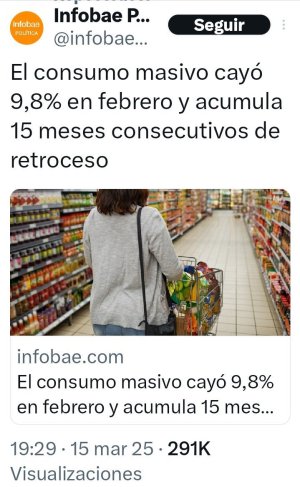The numbers coming out are very ugly. Milei and his followers are trying to paint a different picture but look at the consumption numbers! They are terrible! Worst than during COVID and also after the corralito. Attempts to boost sales are failing. Terrible terrible numbers.

Consumption plunges in Argentina despite Milei's optimism
Consumption in Argentina has dropped below the pandemic and 2001 levels as the South American country's economy continues its erratic behavior under Libertarian President Javier Milei, whose administration depicts a different scenario. A survey conducted by the pollsters Scentia showed the loss...
 en.mercopress.com
en.mercopress.com

Consumption plunges in Argentina despite Milei's optimism
Consumption in Argentina has dropped below the pandemic and 2001 levels as the South American country's economy continues its erratic behavior under Libertarian President Javier Milei, whose administration depicts a different scenario. A survey conducted by the pollsters Scentia showed the loss...





